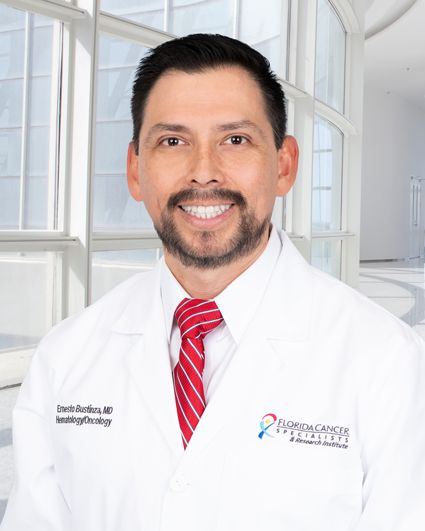PROPHETIC Study Will Evaluate Response to I/O Therapy in Patients With Cancer Using a Diagnostic Platform
Florida Cancer Specialists & Research Institute sites and site worldwide are now recruiting patients for the PROPHETIC study.
Ernesto Bustina-Linares, MD

The PROPHETIC trial (NCT04056247) has started recruitment of patients with stage IV non-small cell lung cancer, stage IV small cell lung cancer, stage IV malignant melanoma, or stage III malignant melanoma to analyze the responsiveness of certain cancer patients to immunotherapy treatment.1
In Florida, one organization, Florida Cancer Specialists & Research Institute (FCS), is leading the state-wide study effort. FCS announced that Ernesto Bustina-Linares, MD will act as the principal investigator for the PROPHETIC trial.2
The FCS will be 1 of 35 sites that will participate in this global, observational study. PROphet, a diagnostic platform from the sponsor of the study, OncoHost, will be used to analyze patient responses and identify resistance to immunotherapy. Previous research has shown that PROphet has predicted patient response with high accuracy.
“The goal of this study is to develop an algorithm that predicts a patient’s treatment outcome. We will also aim to identify the metabolic pathways that could lead to better therapeutic options in the future with the ultimate goal of improving patient outcomes,” said Bustina-Linares, in a statement.
The estimated enrollment is 2000 patients. Investigators will separate patients into 4 cohorts based on disease type. Patients will provide 2 blood samples, and clinical data will be collected from their medical records. Blood sample data and the patients’ medical records will be used to develop the prediction algorithm, and then the objective response rate and the theoretical response prediction will be used to validate the algorithm. The PROPHETIC study’s estimated completion date is predicted to be April 30, 2023.1
“Our ongoing leadership in clinical trials research is helping to further advance the development of therapeutic strategies that enable oncologist to deliver truly personalized medicine,” commented, Michael Diaz, MD, president, and managing physician at FCS. “The resulting algorithm from the PROHPHETIC trial will serve as a vital tool for physicians and patients when making treatment decisions.”
The primary end points are overall response rate (ORR) 3 months after therapy, ORR 6 months after therapy, and any changes in the blood levels of different proteins that represent the host response. Other end points include progression-free survival, overall survival, duration of response, and safety.1
To be considered eligible for this study, adult patients must have at least one measurable lesion, an ECOG performance score between 0 and 2, and normal hematologic, renal, and liver function. Specifically, patients will have an absolute neutrophil count greater than 1500/mm3, a platelet count greater than 100,000/mm3, hemoglobin greater than 9 g/dL, a creatinine concentration of no more than 1.4 mg/dL, or creatinine clearance greater than 40 mL/min, and total bilirubin less than 1.5 mg/dL. Patients will be excluded if they have a concurrent and/or other active malignancy that has required systemic treatment within 2 years of the first dose of the study drug and if the patient is an impairment or mental incompetence that would render the patient unable to understand his/her participation in the study.
The PROHPETIC trial is available to patients in FCS clinical locations within Central Florida. In addition, the study is actively recruiting at centers across the United States, Israel, and the United Kingdom.
References
1. Predicting responsiveness in oncology patients based on host response evaluation during anti cancer treatments (PROPHETIC). ClinicalTrials.gov. Updated April 19, 2022. Accessed May 4, 2022.https://clinicaltrials.gov/ct2/show/study/NCT04056247
2. Florida cancer specialists & research institute participating in global clinical trial analyzing patient responsiveness to immunotherapy treatment. Press release. Florida Cancer Specialists & Research Institute; May 3, 2022. Accessed May 4, 2022. https://bit.ly/3s6W04L